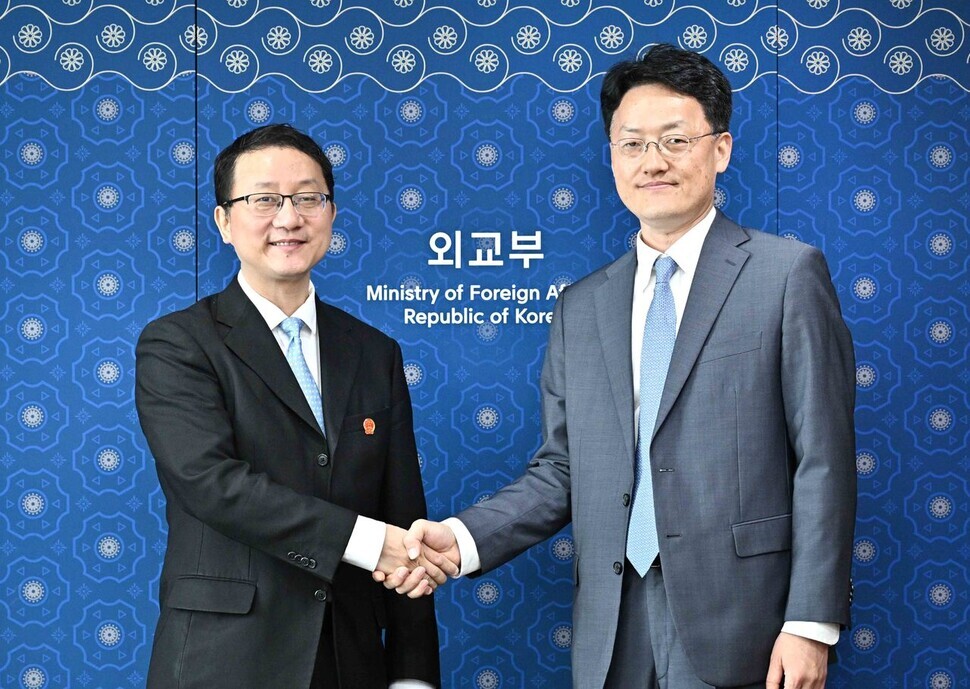hankyoreh
Links to other country sites 다른 나라 사이트 링크
China conveys “Four Noes” to S. Korea, a response to Seoul’s pro-US bias

The Chinese government recently communicated a policy of “Four Noes” to the Yoon Suk-yeol administration in South Korea, taking cooperation on issues including North Korea off the table if Seoul meddles in China’s core interests, such as Taiwan, or actively participates in the US and Japan’s strategies to contain China.
With Beijing directly expressing its displeasure with Yoon’s close diplomacy with the US, concerns about South Korea risking its ties with China are becoming a reality.
Multiple senior diplomatic officials familiar with South Korea-China relations told the Hankyoreh on Tuesday that they “understood that Director-General Liu Jinsong of the Department of Asian Affairs at the Chinese Foreign Ministry came to Seoul on May 22 to inform the Yoon administration of the Chinese government’s ‘Four Noes’ policy regarding South Korea-China relations.”
The “Four Noes” are as follows: no cooperation between the two countries if China’s “core interests” are meddled with (such as the Taiwan issue), no cooperation if South Korea moves towards a unilateral pro-US/pro-Japan foreign policy, no high-level exchanges (such as a state visit to South Korea by President Xi Jinping) if tensions between South Korea and China persist, and no exercise of initiative by South Korea in regard to North Korea so long as Seoul and Beijing’s ties remain sour.
During the meeting, Liu reportedly told Deputy Foreign Minister Choi Young-sam and Choi Yong-jun, the director of the South Korean Foreign Ministry’s Northeast Asian affairs bureau, that his visit was not aimed at “improving relations between China and South Korea,” but at “damage control” between the two countries.
Given the rapid estrangement between South Korea and China since the Yoon administration took office, the Chinese government may have decided that improving ties is out of the question for the time being, and has instead signaled its intention to manage further conflicts and clashes by clearly communicating its core interests and where exactly it will draw the line.
The Chinese Foreign Ministry announced that Liu “set forth solemn positions on China’s core concerns” during his visit, while South Korea’s Foreign Ministry said that the parties had a “frank and open discussion,” suggesting that the atmosphere was not without tension.
Liu also reportedly met privately with Kim Tae-hyo, the first deputy head of the National Security Office.
Liu also is said to have called on the South Korean government to respect and reaffirm the “Three Noes” in regard to the Terminal High Altitude Area Defense, or THAAD, as the Yoon administration has put “normalization” of THAAD bases and additional deployments on the table since taking office.
The “Three Noes” refers to the Moon Jae-in administration’s policy keynote (announced on Oct. 30, 2017) which states that South Korea will not consider additional deployment of THAAD batteries, will not participate in the US missile defense system, and that the trilateral security cooperation between South Korea, the US, and Japan will not evolve into a military alliance.
The Yoon administration has repeatedly stated that it will not be bound by the “Three Noes” in regard to THAAD, saying, “THAAD is a self-defense system and a matter of security sovereignty that can never be subject to negotiation.”
Beijing seems to be displaying irritation at the recent establishment of the Nuclear Consultative Group by the US and South Korea and the proposed establishment of a trilateral North Korean missile information-sharing system involving Japan.
By Lee Je-hun, senior staff writer
Please direct questions or comments to [english@hani.co.kr]

Editorial・opinion
![[Column] Season 2 of special prosecutor probe may be coming to Korea soon [Column] Season 2 of special prosecutor probe may be coming to Korea soon](https://flexible.img.hani.co.kr/flexible/normal/500/300/imgdb/original/2024/0426/3317141030699447.jpg) [Column] Season 2 of special prosecutor probe may be coming to Korea soon
[Column] Season 2 of special prosecutor probe may be coming to Korea soon![[Column] Park Geun-hye déjà vu in Yoon Suk-yeol [Column] Park Geun-hye déjà vu in Yoon Suk-yeol](https://flexible.img.hani.co.kr/flexible/normal/500/300/imgdb/original/2024/0424/651713945113788.jpg) [Column] Park Geun-hye déjà vu in Yoon Suk-yeol
[Column] Park Geun-hye déjà vu in Yoon Suk-yeol- [Editorial] New weight of N. Korea’s nuclear threats makes dialogue all the more urgent
- [Guest essay] The real reason Korea’s new right wants to dub Rhee a founding father
- [Column] ‘Choson’: Is it time we start referring to N. Korea in its own terms?
- [Editorial] Japan’s rewriting of history with Korea has gone too far
- [Column] The president’s questionable capacity for dialogue
- [Column] Are chaebol firms just pizza pies for families to divvy up as they please?
- [Column] Has Korea, too, crossed the Rubicon on China?
- [Correspondent’s column] In Japan’s alliance with US, echoes of its past alliances with UK
Most viewed articles
- 1No good, very bad game for Korea puts it out of Olympics for first time since 1988
- 2[Column] Season 2 of special prosecutor probe may be coming to Korea soon
- 3Korea’s 1.3% growth in Q1 signals ‘textbook’ return to growth, says government
- 4‘We must say no’: Seoul defense chief on Korean, USFK involvement in hypothetical Taiwan crisis
- 5Is N. Korea threatening to test nukes in response to possible new US-led sanctions body?
- 6Division commander ordered troops to enter raging flood waters before Marine died, survivor says
- 7[Column] ‘Choson’: Is it time we start referring to N. Korea in its own terms?
- 8Will NewJeans end up collateral damage in internal feud at K-pop juggernaut Hybe?
- 9Korea sees more deaths than births for 52nd consecutive month in February
- 10[Editorial] Korea’s surprise Q1 growth requires objective assessment, not blind fanfare